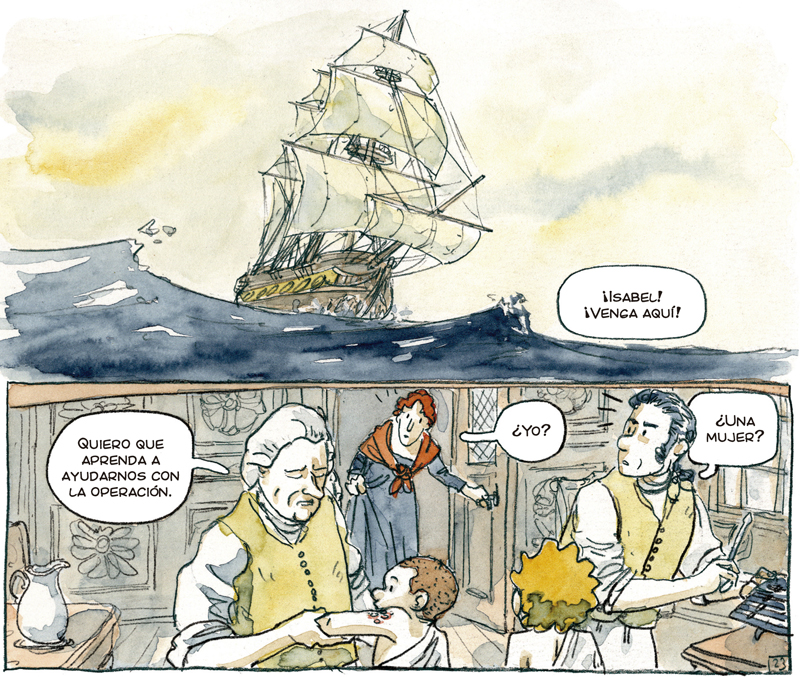
The Spanish odyssey to bring the smallpox vaccine to the colonies of Asia and Latin America
A recent graphic novel recounts the Balmis Expedition, considered the first effort to conduct a global fight against a pandemic.
On Nov. 30, 1803, the corvette María Pita set sail from the port of A Coruña in Northwestern Spain. The ship was carrying more than 50 people, including crew, medical personnel and 22 orphaned children who were inoculated in twos every week with the smallpox vaccine so the virus would arrive "fresh" and active when it reached the Spanish colonies in America and Asia.
Considered the beginning of a first worldwide health campaign, the Royal Philanthropic Vaccine Expedition, better known as the Balmis Expedition, was a campaign promoted by King Charles IV and headed by the Alicante physician Francisco Xavier Balmis with the aim of vaccinating the populations of overseas territories against smallpox.
Forgotten for more than 200 years, the Consejo Superior de Investigaciones Científicas (CSIC), a leading scientific organization in Spain, promoted the publication of two books that recognize the merit of this feat to expand its knowledge among the general public.
The first of these is El mar recordará nuestros nombres (The sea will remember our names)(published in 2021 by Planeta), a graphic novel for adults and children that narrates with illustrated vignettes — mostly starring the children of the crew — the expedition organized by King Charles IV to mass vaccinate the overseas colonies, and curb a pandemic that was killing thousands of people worldwide and threatened to damage the state's public coffers.
"News of the epidemic reached the king at Christmas 1802. If an epidemic like the one in 1792 returned, the whole tax system would collapse, so it was necessary to put a stop to it," explained Susana Ramirez, a researcher at the Complutense University of Madrid (UCM) and coordinator of the second book on the subject, La expedición de Balmis: Primer modelo de lucha global contra las pandemias (The Balmis Expedition: The First Global Model to Fight Pandemics), a monograph published by the CSIC in February of this year that gathers some 20 contributions from specialists in history, law, medicine and philology that analyze the different aspects of the expedition.
"The Balmis Expedition was a fundamental health activity in the history of world science," explained the UCM researcher. "Edward Jenner himself, the discoverer of the smallpox vaccine, said that this philanthropic enterprise should go down in the annals of history. However, the health activity was camouflaged by the independence struggles and did not receive the recognition it deserved: Spain sent health to an empire that was falling apart."
To organize the expedition, the King turned to the Council of the Indies, which chose the Alicante physician Francisco Xavier Balmis to lead it, "a man who was already 50 years old at the time, with an established personal and scientific background," explained Ramirez.
Balmis then recruited a group of people who were optimal for his project.
Among them was Josep Salvany i Lleopart, a 30-year-old Catalan doctor in poor health, who was appointed deputy director of the expedition.
"We don't know how he tricked him into taking it so far. He probably went on a bit of an adventure," said Jiménez.
Also in the expedition's medical crew was Galician nurse Isabel Zendal, who would stay on to care for the 22 children. Zendal is considered by the World Health Organization (WHO) to be the first nurse on an international mission in history.
RELATED CONTENT
Forgotten heroes
To explain the exploits of this scientific expedition to a family audience, illustrator Javier de Isusi decided to focus mainly on the story of the "forgotten heroes" of this adventure like Salvany, who called himself Josef Salvani, and the children. The Catalan doctor had arguably the hardest time during the seven years of his journey — in which he took the opportunity to build vaccination centers and boards in all major cities from Caracas to Peru. He suffered from tuberculosis, malaria, and lost sight in one eye in Colombia. His body eventually failed to resist the ups and downs of the Andes and he died in Cochabamba, Bolivia, in 1810, at the age of 34.

"Salvany was the great forgotten character, until recently they did not dedicate a plaque to him in the Cochabamba church where he is buried," said Isusi, winner of the 2020 National Comic Award.
Isusi makes Benito, Isabel Zendal's nine-year-old son, who was one of the 22 children aboard the ship, the protagonist of several of his vignettes. Salvany and Benito — who had grown up without a father — develop an endearing father-son relationship during the voyage.
"We shouldn't care that no one remembers our names, Benito. The greatest heroes are always anonymous (...) The sea knows their names!" Salvany says to Benito, whom the illustrator defines as "a very affable, sensitive man, who was liked by everyone." Today, Salvany's name adorns the Catalan Public Health building in Barcelona's Poblenou neighborhood.
"Little is known about these children, other than that they left the hospice in Santiago de Compostela and ended up in the hospice in Mexico City," said Jiménez, saying that Mexican children were recruited for the second mission to the Philippines.
Isusi, who followed closely the biography of some of these children with the help of a Galician journalist, said that many of them were adopted by wealthy families in Mexico and one of them even became a professor and founder of schools in the country.
"They were promised that they would have an education when they arrived in Mexico, that they would have a better future than the one that awaited them in La Coruña, and it seems that the promise was fulfilled," he said.












LEAVE A COMMENT: